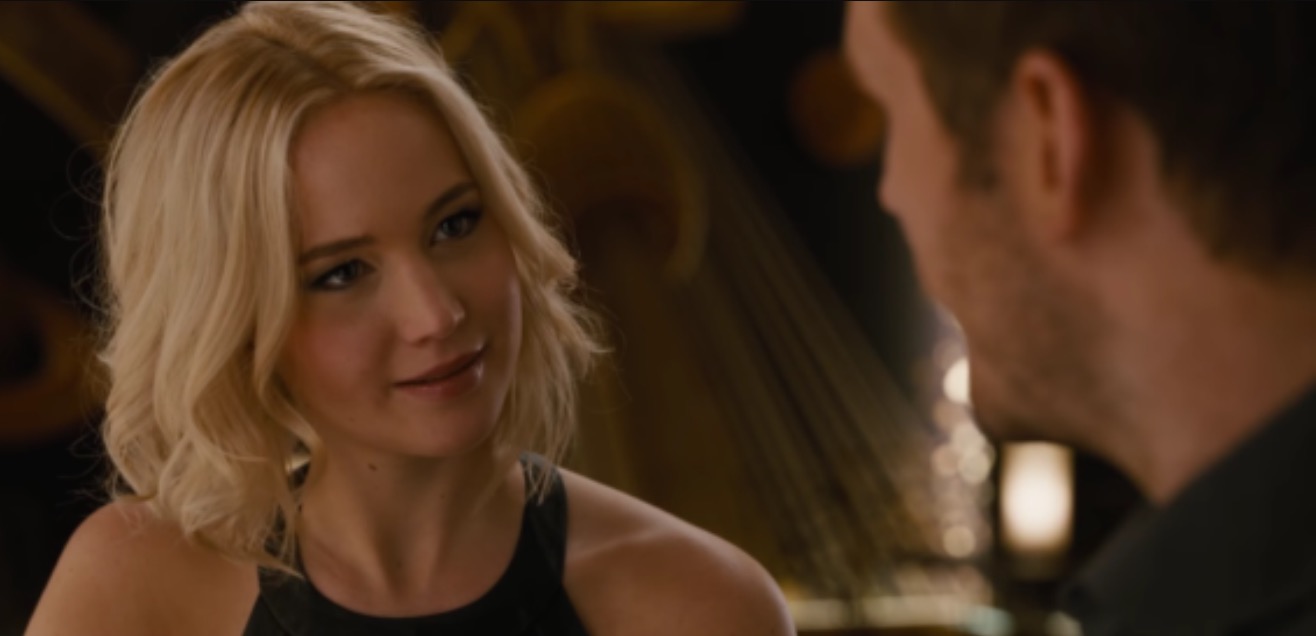Jennifer Lawrence’s Comments about Her Passengers Sex Scene are Sad and Revealing
Currently in theaters is the blockbuster hit titled Passengers, featuring Jennifer Lawrence and Chris Pratt. The sci-fi story starts aboard a huge spaceship in which all crew members and passengers are hibernating in a deep, life-pausing sleep not to be awoken for 120 years when they reach a planet called Homestead II. Along the way, Jim (Pratt) and Aurora (Lawrence) find themselves awake early and looking at an 89-year journey on the spaceship, never to arrive at their destination. It’s the stuff of nightmares (and intriguing film premises).
The film is well-acted and dives into the ethical dilemmas that fantasy thrillers so often can; Scarlett Johansson and Ewan McGregor’s 2005 flick The Island comes to mind as another thought-provoking joy ride. But Passengers unfortunately falls victim to the pressures that so many movies suffer from today—to force-feed unnecessary sexualized scenes into an otherwise thoughtful story line.
At one point in the film when Lawrence is trying with all her might to open a device, she flails to the point that her chest is busting out of her shirt. When she gets hit by a flying projectile, she rips off her shirt to bandage the wound. When she goes on her daily swim, her suit just happens to be something that would fit seamlessly into a Victoria’s Secret catalog. And when Jim and Aurora develop a romance, we have to see one, two, three, four scenes where they are depicted having sex.
The shameless sex appeal insertions may not kill the story, but they do bring me pause. Especially because Lawrence has said in interviews how uncomfortable she felt in the filming of the scenes.
Earlier this year, on a roundtable with the Hollywood Reporter, Lawrence was asked what her toughest moment as an actress was thus far. She immediately said that she had recently acted in her “first real sex scene,” which was for Passengers, and she called it “a bizarre experience.” Despite saying that everything “was done right” (meaning her colleagues were professional), she said she was so uncomfortable that she had to prepare for the scene by drinking. “You drink. You get really, really drunk,” she said. But that drinking, Lawrence said, only “led to more anxiety.”
She spoke specifically about her concerns over the fact that her costar was married, saying it was her first time ever kissing a married man. “I knew it was my job, but I couldn’t tell my stomach that,” she said.
Hearing Lawrence’s words gave me shivers. Sure, we’re talking about actors portraying a fictional scenario, but the notion Lawrence highlights about needing liquid courage (or rather, a liquid buffer) in sexual situations is not a phenomenon confined to the movie set.
There’s no question that alcohol and hookup sex go hand in hand for many young women today. One study of 828 college students revealed that those who reported hooking up sometime within the past year were more likely to have been drinking when they met their partners the night of the hookup. The same study found that “females who were drinking beforehand . . . were more likely to feel discontent with their hookup decisions.” We sort of know there’s a problem here. But rarely do we hear it talked about front and center in celebrity news. Whether it’s a role for a film or a real-life hookup, though, there’s a problem with lowering our inhibitions about sexual things.
Using alcohol or some other means to get in the mood for sex when we aren’t naturally suggests something inherently risky and problematic—that if we don’t want to have a sexual encounter, we should do so anyway; that we should stifle those inhibitions. But natural instincts are not a trivial thing—and especially in the sexual realm, it’s quite dangerous to ignore our “gut feelings” about things.
We already know that unwanted sexual experiences have psychological repercussions, often ones that aren’t easily shaken off. We know it can take a long time for many women to decompress from the trauma—often years pass before they can even speak of it.
If we know this in the interpersonal realm, why shouldn’t this apply to the professional?
Some might criticize Lawrence on the basis of, “Hey, you signed up for this role. You’re getting paid for this role. Play the role, and be quiet.” Well, for what it’s worth, she ostensibly did just this. Like many leading actresses today, she says she has never refused a scene. But surely she’s allowed to say after the fact if she felt uncomfortable during it. Would we want a world where she couldn’t? That world sounds scarily like the 1970s when Maria Schneider suffered through a sex scene in Last Tango in Paris that wasn’t explained accurately to her in advance. “I was crying real tears,” Schneider told the Daily Mail after thirty years of silence. “I felt humiliated.”
Schneider’s discomfort came from going off-script, but some actors express discomfort from sex scenes even when they’re on-script. Dakota Johnson told Glamour magazine about the first filming of Fifty Shades of Grey, saying that even though she knew it was coming, it was worse than she expected. Of the moments she described as “so f–king painful” and “emotionally taxing,” Johnson said, “At first I was like, ‘Oh my God, this is the worst thing ever,’ and then I was like, ‘All right, let’s get on with it.’”
On with it, she went. As did Lawrence. And on we all go. But perhaps we’re coming up on a cultural moment here. Perhaps we’re on the cusp of realizing that some of the things we see on film aren’t what they seem. Maybe what we see is actually really bad. It’s OK to depict women being harmed or objectified on film to further a story line, but we expect that the actors aren’t actually being harmed, right? As these actors speak up, though, the lines seem a bit blurred, and we’re now faced with the realization that these scenes are more than just for the sake of the show. They have a lasting effect.
I, for one, am glad Lawrence spoke up. Because her words sound like the kind of things I hear from girlfriends who tell me about uncomfortable sexual experiences they’ve had—voices that stay in the shadows. If women feel uncomfortable in sexual situations, they should speak up. Then, one hopes, more women over time will realize they don’t have to go through with sexual encounters they’re uncomfortable with. They don’t have to change themselves or get drunk in order to impress someone else. Don’t we want that for our future generations? And as far as Hollywood is concerned, maybe the time has come for us to be more discerning viewers—to not choose blind entertainment without considering how it came to be.
As Aurora says in the film to the android bartender Arthur, “Broken hearts aren’t that simple.” The same goes for sexual matters. Passengers didn’t need Lawrence’s undressed sex scenes to further its story. And women don’t need to drink themselves into hookups to enhance their worth. The sooner we take women’s inhibitions seriously rather than covering them up, the sooner we’ll all get to authentically tackling our culture’s perennial issue with sexual consent.
This article was originally published on Verily.com.













Thank you so much for finally addressing the issues–detracting from an otherwise good movie with sex scenes and exposure, not to mention the demoralizing of the people acting. For a society so bent on liberating women, Holly wood does the opposite continually using women!
The interview awkwardly ended after her comment, with the two actors seemingly getting disconnected from the call without signing off. Hosts Matty Acton and Sophie Monk then argued over whether the duo cut the interview short intentionally or whether they were accidentally disconnected.